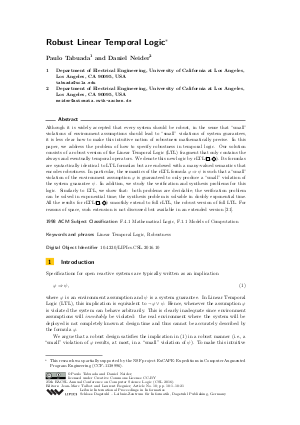Robust Linear Temporal Logic
Authors Paulo Tabuada, Daniel Neider
-
Part of:
Volume:
25th EACSL Annual Conference on Computer Science Logic (CSL 2016)
Part of: Series: Leibniz International Proceedings in Informatics (LIPIcs)
Part of: Conference: Computer Science Logic (CSL) - License:
 Creative Commons Attribution 3.0 Unported license
Creative Commons Attribution 3.0 Unported license
- Publication Date: 2016-08-29
File

PDF
LIPIcs.CSL.2016.10.pdf
- Filesize: 0.6 MB
- 21 pages
Document Identifiers
Subject Classification
Keywords
- Linear Temporal Logic
- Robustness
Metrics
- Access Statistics
-
Total Accesses (updated on a weekly basis)
0Document
0Metadata
Abstract
Although it is widely accepted that every system should be robust, in the sense that "small" violations of environment assumptions should lead to "small" violations of system guarantees, it is less clear how to make this intuitive notion of robustness mathematically precise. In this paper, we address the problem of how to specify robustness in temporal logic. Our solution consists of a robust version of the Linear Temporal Logic (LTL) fragment that only contains the always and eventually temporal operators.
Cite As Get BibTex
Paulo Tabuada and Daniel Neider. Robust Linear Temporal Logic. In 25th EACSL Annual Conference on Computer Science Logic (CSL 2016). Leibniz International Proceedings in Informatics (LIPIcs), Volume 62, pp. 10:1-10:21, Schloss Dagstuhl – Leibniz-Zentrum für Informatik (2016)
https://doi.org/10.4230/LIPIcs.CSL.2016.10
BibTex
@InProceedings{tabuada_et_al:LIPIcs.CSL.2016.10,
author = {Tabuada, Paulo and Neider, Daniel},
title = {{Robust Linear Temporal Logic}},
booktitle = {25th EACSL Annual Conference on Computer Science Logic (CSL 2016)},
pages = {10:1--10:21},
series = {Leibniz International Proceedings in Informatics (LIPIcs)},
ISBN = {978-3-95977-022-4},
ISSN = {1868-8969},
year = {2016},
volume = {62},
editor = {Talbot, Jean-Marc and Regnier, Laurent},
publisher = {Schloss Dagstuhl -- Leibniz-Zentrum f{\"u}r Informatik},
address = {Dagstuhl, Germany},
URL = {https://drops.dagstuhl.de/entities/document/10.4230/LIPIcs.CSL.2016.10},
URN = {urn:nbn:de:0030-drops-65508},
doi = {10.4230/LIPIcs.CSL.2016.10},
annote = {Keywords: Linear Temporal Logic, Robustness}
}
Author Details
References
-
Shaull Almagor and Orna Kupferman. Latticed-ltl synthesis in the presence of noisy inputs. In FOSSACS 2014, volume 8412 of LNCS, pages 226-241. Springer, 2014.

-
Rajeev Alur, Aditya Kanade, and Gera Weiss. Ranking automata and games for prioritized requirements. In CAV 2008, volume 5123 of LNCS, pages 240-253. Springer, 2008.

-
Christel Baier and Joost-Pieter Katoen. Principles of Model Checking (Representation and Mind Series). The MIT Press, 2008.

-
Roderick Bloem, Krishnendu Chatterjee, Karin Greimel, Thomas A. Henzinger, and Barbara Jobstmann. Robustness in the presence of liveness. In CAV 2010, volume 6174 of LNCS, pages 410-424. Springer, 2010.

-
Roderick Bloem, Karin Greimel, Thomas A. Henzinger, and Barbara Jobstmann. Synthesizing robust systems. In FMCAD 2009, pages 85-92. IEEE, 2009.

-
Swarat Chaudhuri, Sumit Gulwani, and Roberto Lublinerman. Continuity analysis of programs. In POPL 2010, pages 57-70. ACM, 2010.

-
Alexandre Donzé and Oded Maler. Robust satisfaction of temporal logic over real-valued signals. In FORMATS 2010, volume 6246 of LNCS, pages 92-106. Springer, 2010.

-
Laurent Doyen, Thomas A. Henzinger, Axel Legay, and Dejan Nickovic. Robustness of sequential circuits. In ACSD 2010, pages 77-84. IEEE, 2010.

-
Rüdiger Ehlers and Ufuk Topcu. Resilience to intermittent assumption violations in reactive synthesis. In HSCC 2014, pages 203-212. ACM, 2014.

-
Georgios E. Fainekos and George J. Pappas. Robustness of temporal logic specifications for continuous-time signals. Theor. Comput. Sci., 410(42):4262-4291, 2009.

-
Erich Grädel, Wolfgang Thomas, and Thomas Wilke, editors. Automata, Logics, and Infinite Games: A Guide to Current Research, volume 2500 of LNCS. Springer, 2002.

-
B. Jonsson and A. Tarski. Boolean algebras with operators. Part I. American Journal of Mathematics, 73(4):891-939, 1951.

-
Orna Kupferman and Yoad Lustig. Lattice automata. In VMCAI 2007, volume 4349 of LNCS, pages 199-213. Springer, 2007.

-
Rupak Majumdar and Indranil Saha. Symbolic robustness analysis. In RTSS 2009, pages 355-363. IEEE, 2009.

-
Doron Peled and Thomas Wilke. Stutter-invariant temporal properties are expressible without the next-time operator. Information Processing Letters, 63(5):243-246, 1997.

-
Dominique Perrin and Jean-Eric Pin. Infinite Words, volume 141 of Pure and Applied Mathematics. Elsevier, 2004.

-
Nir Piterman and Amir Pnueli. Faster solutions of rabin and streett games. In LICS 2006, pages 275-284. IEEE, 2006.

-
G. Priest. Dualising Intuitionist Logic. Principia, 13(2):165-184, 2009.

- Aurélien Rizk, Grégory Batt, François Fages, and Sylvain Soliman. A general computational method for robustness analysis with applications to synthetic gene networks. Bioinformatics, 25(12), 2009. URL: http://dx.doi.org/10.1093/bioinformatics/btp200.
-
Shmuel Safra. On the complexity of omega-automata. In FOCS 1988, pages 319-327. IEEE, 1988.

-
P. Tabuada and D. Neider. Robust Linear Temporal Logic, 2015. arXiv:1510.08970.

-
Paulo Tabuada, Sina Yamac Caliskan, Matthias Rungger, and Rupak Majumdar. Towards robustness for cyber-physical systems. IEEE Trans. Automat. Contr., 59(12):3151-3163, 2014.

- Milan Česka, David Šafránek, Sven Dražan, and Luboš Brim. Robustness analysis of stochastic biochemical systems. PLoS ONE, 9(4), 2014. URL: http://dx.doi.org/10.1371/journal.pone.0094553.
